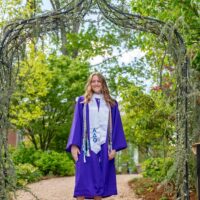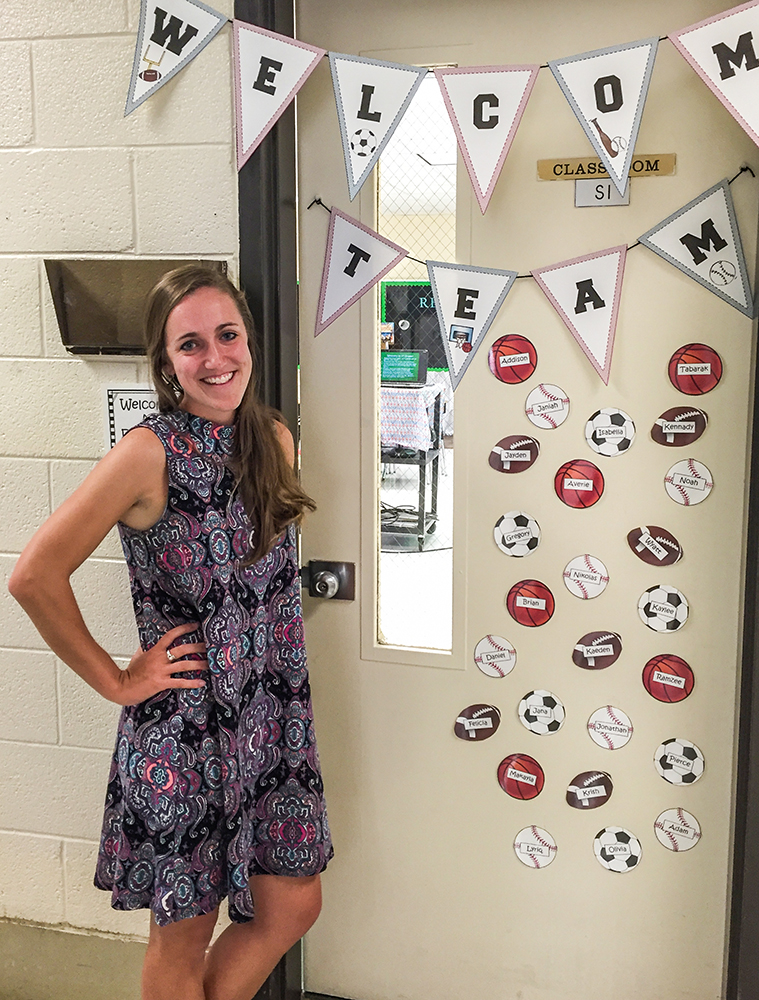The education program at High Point University has long been recognized for its excellence throughout North Carolina and the eastern United States. Our program is based within the liberal arts tradition; it is rigorous, field-centered and highly personalized. The teacher education programs at High Point University meet the requirements of the North Carolina State Board of Education.
Effective Fall 2019:
Students pursuing degrees in the School of Education will have the option of selecting between the Licensure-Track and Non-Licensure Track programs of study within the Elementary Education, Special Education, Middle Grades Education or Health/Physical Education programs of study.
Licensure Track:
Student Teaching with N.C. licensure will become an optional track that students may pursue at the end of the program. Choosing this track requires completion of the mandatory 16-week student teaching, all related licensure tests, and the edTPA portfolio. These credits will be included in the required 128 to graduate.
Degree ONLY (Non-Licensure Track)
Students who choose (or who are moved) to the non-licensure track in the degree program will earn a B.A. degree in Elementary Education, Special Education, Middle Grades Education or Health/Physical Education. Instead of student teaching students will complete other university electives to reach the required 128 credits for graduation and a four credit internship that is not student teaching. The School of Education does not apply for North Carolina license as the required student teaching, edTPA portfolio, and teacher exams are not part of this track.
Elementary Education Program of Study 2024-2025
| Degree Requirements | Credits |
|---|---|
| Major Requirements | 70 |
| University Core Requirements | 36-44 |
| Electives | 14-22 |
| Total | 128 |
| Concentration | Credits |
|---|---|
| Literacy Concentration | 12 |
| STEM Concentration | 12 |
| Course | Course Title | Credits |
|---|---|---|
| EDU 1200 | Introduction to Teaching* | 2 |
| EDU 2100 | Educational Psychology* (required supporting course, GE: Social Science) | 4 |
| EDU 2200 | Critical Perspectives in Teaching and Learning* (GE: American Context) | 4 |
| EDU 3100 | Students with Disabilities: Characteristics and Service Delivery Models | 4 |
| EDU 3110 | Educational Technology | 2 |
| EDU 3130 | Methods of Teaching Foundational Literacy | 4 |
| EDU 3131 | Integration of Fiction and Nonfiction Texts in the Elementary Classroom | 2 |
| EDU 3133 | Methods of Teaching Mathematics I: Operation and Number | 4 |
| EDU 3230 | Methods of Teaching Reading and Writing in the Intermediate Grades | 4 |
| EDU 3232 | Integrated Practicum in the Elementary Classroom | 2 |
| EDU 3233 | Methods of Teaching Mathematics II: Geometry, Measurement, and Data Analysis | 4 |
| EDU 3234 or 3245 | Behavioral Intervention and Supports (ELED) or Classroom and Behavioral Mgt. (SPED Minor) | 2 |
| EDU 4110 | Technology Integration for Elementary K-6 Classrooms | 2 |
| EDU 4130 | Classroom and Behavior Management: Elementary Focus | 2 |
| EDU 4133 | Methods of Teaching Social Studies K-6 | 2 |
| EDU 4134 or EDU 4811 | Introduction to Student Teaching or Internship in Education | 4 |
| EDU 4135 | Integrating the Arts in the Elementary Classroom | 2 |
| EDU 4166 | Analyzing and Evaluating K-12 Assessment Data | 2 |
| EDU 4200 | Diverse Learners and Culturally Relevant Pedagogy (GE: Diversity) | 4 |
| EDU 4233 | Principles of Integrated Instruction: Math/Science | 4 |
| PEC 2130 | Healthy Living for the Elementary Child (required supporting course) | 4 |
| PSC or HST | American History/American Politics: see choices in Program of Study (required supporting course) | 4 |
| *These courses are prerequisites for admission to the Ed Preparation Program. The following courses are required for licensure: | ||
| EDU 4000 | Investigation of Teacher Performance Assessment I | 1 |
| EDU 4001 | Investigation of Teacher Performance Assessment II | 4 |
| EDU 4230 | Student Teaching Continuation | 6 |
| Additional General Education Required Coursework | ||
| GE | First Year Writing | 4 |
| GE | Foreign Language (1020 | 4 |
| GE | Intellectual Discovery | 4 |
| GE | Arts | 4 |
| GE | Ethical Reasoning and Religious Traditions | 4 |
| GE | Humanities | 4 |
| GE | Integrative Course | 4 |
| GE | Natural Science | 4 |
| GE | Quantitative Reasoning | 4 |
| Course Descriptions | ||
| Course | Course Title | Credits |
|---|---|---|
| EDU 4510 | Advanced Instructional Technology for the 21st Century | 3 |
| EDU 4536 | Integrated Principles of Literacy and Social Studies Instruction | 3 |
| EDU 4540 | Societal and Organizational Perspectives | 3 |
| EDU 4560 | Developing Leaders in 21st Century Systems | 3 |
| Requirements for B.A. to M.Ed Program in Elementary Education STEM Concentration | ||
| EDU 4511 | Technology Integration for Elementary STEM-Based Programs | 3 |
| EDU 4533 | Integrated Principles of Science and Social Studies Instruction | 3 |
| EDU 4540 | Societal and Organizational Perspectives | 3 |
| EDU 4560 | Developing Leaders in 21st Century Systems | 3 |
| Course Descriptions | ||
-NC District Teachers of the Year
-NC District Rookie Teachers of the Year
-NC District Principals of the Year
-Teacher Assistants of the Year
- Science Teacher
- Special Education Teacher
- Elementary School Teacher
- Middle Grades Teacher
- Health Education Teacher
- Preschool Teacher
- Math Teacher
- Physical Education Teacher
- Science Teacher
- Special Education Teacher
- Elementary School Teacher
- Middle Grades Teacher
- Health Education Teacher
- Preschool Teacher
- Math Teacher
- Physical Education Teacher
- The School of Education is housed in a brand new LEED-Certified facility which includes an expansive Teacher- Resource Center, a simulated elementary classroom methods lab and $250,000 of state-of-the-art technology
- HPU offers programs of study that reflect the latest research on best practices in teaching
- Experiential learning opportunities in the community allow for HPU students to become deeply connected with the area, including Literacy Nights and LEGO Education Workshops
- Opportunities to engage in study course material on trips to various venues, including the U.S. Space and Rocket Center in Huntsville, Ala.
- Students have a choice of many opportunities including service learning, undergraduate research and B.A. to M.Ed. program
- Faculty includes former school superintendents, classroom teachers, school psychologists, principals and curriculum specialists, all of whom are currently engaged in scholarship and public school K-12 initiatives
All undergraduate students who complete the degree in elementary education are required to pass the Pearson’s Foundations of Reading and Praxis Content Knowledge for Teaching (CKT) tests in order to be eligible for N.C. teacher licensure.
- Kappa Delta Pi (International Honor Society in Education)
- North Carolina Association of Elementary Educators
- Teachers of Tomorrow
- Student Council for Exceptional Children











